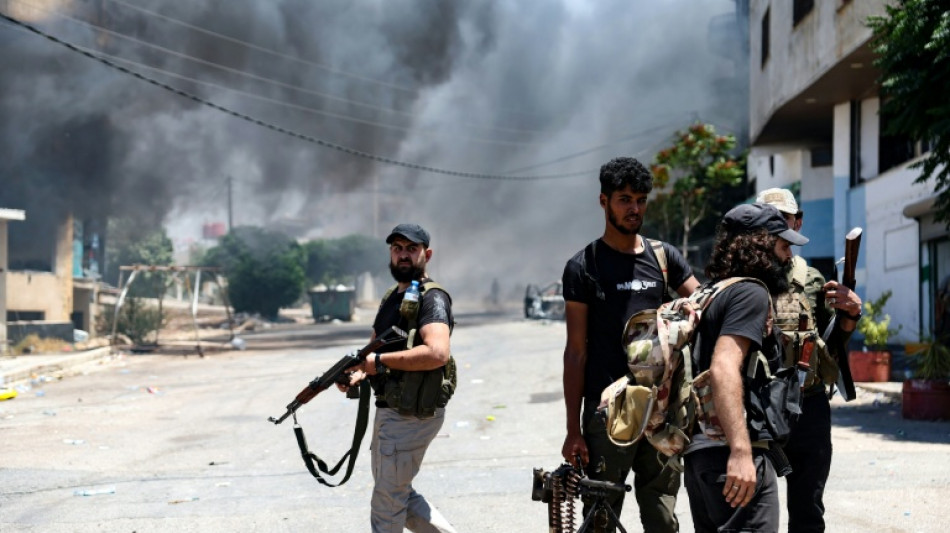
RBGPF
0.1000


Syrian Bedouin and their allies fought Druze fighters in the community's Sweida heartland for a seventh day Saturday despite a ceasefire ordered by the government following a US-brokered deal to avert further Israeli military intervention.
AFP correspondents reported clashes in the west of the provincial capital as Druze fighters battled armed Bedouin supported by tribal gunmen from other parts of Syria.
The interior ministry announced that internal security forces had begun deploying in Sweida province and AFP correspondents saw them manning checkpoints trying to prevent more people from joining the fighting.
Israel had bombed government forces in both Sweida and Damascus earlier this week to force their withdrawal after they were accused of summary executions and other abuses against Druze civilians during their brief deployment in the southern province.
More than 900 people have been killed in Sweida since Sunday as sectarian clashes between the Druze and Bedouin drew in the Islamist-led government, Israel and armed tribes from other parts of Syria.
Druze fighters said those who arrived to support the Bedouin were mostly Islamists.
One armed tribesman, who identified himself only as Abu Jassem, told AFP that "we will slaughter them (the Druze) in their homes".
- US-brokered deal -
The deal between the Islamist-government and Israel was announced by Washington early on Saturday Damascus time.
US pointman on Syria, Tom Barrack, said interim President Ahmed al-Sharaa and Israeli Prime Minister Benjamin Netanyahu "have agreed to a ceasefire" negotiated by the United States.
Barrack, who is US ambassador to Ankara, said the deal had the backing of Turkey, a key supporter of Sharaa, as well as neighbouring Jordan.
"We call upon Druze, Bedouins and Sunnis to put down their weapons and together with other minorities build a new and united Syrian identity in peace and prosperity with its neighbours," he wrote on X.
The US administration, which has sided with Turkey and Saudi Arabia in forging ties with the Islamist president despite his past links with Al-Qaeda, was critical of its Israeli ally's air strikes on Syria earlier this week and had sought a way out for his government.
Sharaa followed up on the US announcement with a televised speech on Saturday in which he renewed his pledge to protect Syria's ethnic and religious minorities.
"The Syrian state is committed to protecting all minorities and communities in the country... We condemn all crimes committed" in Sweida, he said.
The president paid tribute to the "important role played by the United States, which again showed its support for Syria in these difficult circumstances and its concern for the country's stability".
The European Union welcomed the deal between Syria and Israel, saying it had been "appalled" by the deadly sectarian violence of recent days.
But Israel expressed deep scepticism about Sharaa's renewed pledge to protect minorities, pointing to deadly violence against Alawites as well as Druze since he led the overthrow of longtime leader Bashar al-Assad in December.
In Sharaa's Syria "it is very dangerous to be a member of a minority -- Kurd, Druze, Alawite or Christian", Foreign Minister Gideon Saar posted on X.
- 'No more room in morgue' -
The Syrian Observatory for Human Rights, a Britain-based war monitor, said at least 940 people had been killed in the violence since Sunday.
They included 326 Druze fighters and 262 Druze civilians, 165 of whom were summarily executed.
They also included 312 government security personnel and 21 Sunni Bedouin, three of them civilians who were "summarily executed by Druze fighters". Another 15 government troops were killed in Israeli strikes, the Observatory said.
On Friday in the corridors of the city's main public hospital, a foul odour emanated from the swollen and disfigured bodies piled up in refrigerated storage units, an AFP correspondent reported.
Doctor Omar Obeid told AFP that the hospital had received "more than 400 bodies" since Monday morning.
"There is no more room in the morgue. The bodies are in the street," he added.
The International Committee for the Red Cross said that health facilities were overwhelmed.
"The humanitarian situation in Sweida is critical. People are running out of everything," said Stephan Sakalian, the head of the ICRC's delegation in Syria.
According to the United Nations, the fighting has displaced least 87,000 people.
burs-kir/lg/jsa
F.Brown--ThChM